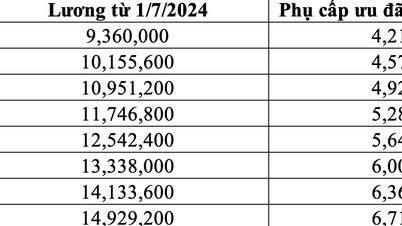The 48-year-old woman from Thai Binh had been treated at many hospitals for prolonged abdominal pain, high fever and urinary system abnormalities. Initially, she was diagnosed with hydronephrosis and monitored for ureteral abscess.
Doctors performed many procedures and surgeries such as laparoscopic abscess removal, JJ tube placement for the left ureter, and open ureteroplasty due to perforation complications.
In September 2024, she continued to have a high fever of 40-41°C, urinary retention, and severe urinary tract infection that did not respond to antibiotics.
She was transferred to the Central Hospital for Tropical Diseases in a state of sepsis and increased pain in the lower abdomen. Ultrasound and CT scan results revealed a large lesion close to the bladder wall and the left iliac fossa. The doctor suspected a tumor and decided to perform emergency open surgery to clarify the cause.
During the two-hour surgery, doctors discovered two tumors: one in the left ovary, the other behind the uterus and had invaded the bladder wall. Both tumors and the uterus were completely removed. After surgery, the patient's health gradually stabilized, the surgical wound dried well, and chemotherapy was indicated.

However, the abnormality was only discovered when the samples were sent for surgery. After three analyses, many inter-hospital and international consultations, the doctors determined that she had an extremely rare form of cancer: histiocytic sarcoma (HS).
Doctor Vu Xuan Ngoc, in charge of the Department of Pathology, said HS is a very rare form of cancer, related to malignant blood diseases or germ cell tumors, with an incidence rate of only about 0.17 cases per million people.
“This is a very complex disease, easily confused with lymphoma, poorly differentiated carcinoma, sarcoma or histiocytosis X. Therefore, careful morphological analysis and specific immunological tests are needed for accurate diagnosis,” Dr. Ngoc said.
HS can appear in any organ in the body, the symptoms are very diverse so it is often misdiagnosed. In the above case, if not persistently treated and operated to find the root cause of the damage, this disease can continue to be missed.
If detected and treated early, people with histiocytic sarcoma still have a chance of effective treatment, especially when the disease has not spread widely. This is one of the few cases in Vietnam that has been accurately diagnosed, thanks to the coordination of many specialties and international consultation.
Source: https://baolangson.vn/phat-hien-ung-thu-hiem-gap-xam-lan-bang-quang-sau-nhieu-lan-phau-thuat-5044749.html



![[Photo] Top players gather at the 2025 Nhan Dan Newspaper National Table Tennis Championship](https://vphoto.vietnam.vn/thumb/1200x675/vietnam/resource/IMAGE/2025/5/23/9ad5f6f4faf146b08335e5c446edb107)




























































































Comment (0)